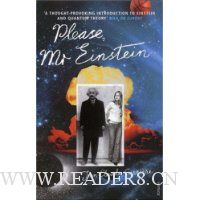基本信息·出版社:Vintage Books ·页码:208 页 ·出版日期:2007年03月 ·ISBN:0099497131 ·条形码:9780099497134 ·装帧:平装 ·正文语种:英语 ...
| 商家名称 |
信用等级 |
购买信息 |
订购本书 |
|
|
 |
Please, Mr Einstein |
 |
|
 |
Please, Mr Einstein |
 |

基本信息·出版社:Vintage Books
·页码:208 页
·出版日期:2007年03月
·ISBN:0099497131
·条形码:9780099497134
·装帧:平装
·正文语种:英语
·外文书名:爱因斯坦先生,请!
内容简介 A young woman enters a building in a nameless contemporary European city. She walks into a waiting room where a dozen other people, with briefcases or sheaves of documents, are waiting patiently. Shortly afterwards she is requested to go into another room where she meets Albert Einstein who is engaged in trying to figure out the equation that explains the universe. He is charmed by her, and agrees to answer her questions. He seems very used to receiving visitors. Among them, Isaac Newton is certainly the most regular and the most argumentative, desperately trying to prove Einstein wrong. Einstein and the student discuss his theories as well as his responsability for the creation of nuclear weapons. He also talks about his personal life, the difficulties of fame, and how his dreams of worldwide peace were shattered. He appears bright, witty, hugely sympathetic but also tormented and dreamy. This is a remarkable book that makes complex concepts of physics and philosophy accessible to the non-scientific reader in a captivating and utterly charming manner.
作者简介 Jean-Claude Carriere is a writer, playwright and screenwriter. He is notably the co-author of Conversations About the End of Time (with Stephen Jay Gould, Umberto Eco, etc.) He has also worked with Peter Brook, Milos Forman, Bunuel, Godard and the Dalai Lama. Translated from the French by John Brownjohn.
编辑推荐 From Publishers Weekly French screenwriter Carrière (he worked on
Belle de Jour and
The Discreet Charm of the Bourgeoisie) sets out to make the elegant beauty of Einstein's ideas manifest to lay readers in this thin, pleasant novel-dialogue. It is the early 21st century, and a young, nameless student intent on learning more about Einstein finds her way into a mysterious office that houses—Einstein himself, walking and talking, full of generosity and the urge to make his ideas plain. The expected thought-experiments (an elevator with no frame of reference, two trains moving side by side) cover the basics of relativity, but soon the young student presses Einstein, who thought deeply about such questions, to examine the morality of his achievements: could the world after Hiroshima truly be a better place? Carrière's Einstein, like the real one, is decidedly conflicted on the topic, and one of the novel's few dramatic moments comes when the smartest man in the world is unable to provide all the answers. The book offers the certain pleasure of knowing the world better, and, even more important to Carrière, of knowing oneself as one who can understand it.
(Nov.) Copyright © Reed Business Information, a division of Reed Elsevier Inc. All rights reserved.
--This text refers to the Hardcover edition. From Booklist *Starred Review* The time travel that Einstein predicted in his revolutionary physics wonderfully harmonizes with the time travel Carriere delivers through fictional wizardry. The space-time foray begins as readers accompany a nameless young woman into a mysterious Central European building where an elderly woman presides over a large waiting room, filled with strangely attired men clutching files filled with secrets. But those secrets begin to unfold when the woman escorts her visitor into a cluttered study occupied by Albert Einstein, still working in inspired isolation on a unifying theory of everything. Unruffled, the young visitor turns on her tape recorder and begins to ask Einstein for help in understanding his science and his place in history. Einstein obligingly begins to lecture his visitor, periodically stepping to one of the doors of his study, magically transformed into portals to various times and places--terrestrial and galactic. The accessible dialogue (deftly translated) turns relativity into the explanatory key for everything from a bouncing basketball to the receding galaxies in the night sky while illuminating both the issues and the personalities involved in Einstein's radical break with Newton and his long-running debate with Bohr. Finally, the enchanted doors transport the conversing pair to the sobering events that forced Einstein from Nazi Germany and made a lifetime pacifist into a reluctant advocate of the project that raised a lethal mushroom cloud over Hiroshima. Unanswered questions remain as the inquisitive young woman concludes her visit. But readers will thank her and her creator for an incomparable intellectual experience.
Bryce ChristensenCopyright © American Library Association. All rights reserved --This text refers to the Hardcover edition. Review “In Carrière’s story…undecidability and doubt have leached out of science and into ethics.”
–Lisa Jardine,
The Times




